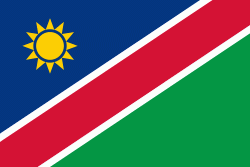Okaku Constituency (Okaku Constituency)
Okaku Constituency is an electoral constituency in the Oshana Region of Namibia. It had 19,262 inhabitants in 2004 and 10,384 registered voters. Its district capital is the settlement of Okaku. Okaku falls under the Ondonga Traditional Authority.
Okaku residents depend on farming. They cultivate their fields on a subsistence basis to get food such as millet, beans, melons, sorghum and nuts. Their staple is porridge (oshithima), and their traditional drink is ontaku.
Okaku constituency is traditionally a stronghold of the South West Africa People's Organization (SWAPO) party. Its first councillor is Henock ya Kasita who served the constituency from Namibian independence till 2010. Ya Kasita was followed by Joseph Kapya Endjala who was the head of Cosdec centre in Ondangwa.
In the 2015 local and regional elections the SWAPO candidate won uncontested and became councillor after no opposition party nominated a candidate. The SWAPO candidate won the 2020 regional election by a large margin. Gerson Kapenda obtained 3,261 votes, followed by Foibe Nashongo of the Independent Patriots for Change (IPC), an opposition party formed in August 2020, with 970 votes.
Okaku residents depend on farming. They cultivate their fields on a subsistence basis to get food such as millet, beans, melons, sorghum and nuts. Their staple is porridge (oshithima), and their traditional drink is ontaku.
Okaku constituency is traditionally a stronghold of the South West Africa People's Organization (SWAPO) party. Its first councillor is Henock ya Kasita who served the constituency from Namibian independence till 2010. Ya Kasita was followed by Joseph Kapya Endjala who was the head of Cosdec centre in Ondangwa.
In the 2015 local and regional elections the SWAPO candidate won uncontested and became councillor after no opposition party nominated a candidate. The SWAPO candidate won the 2020 regional election by a large margin. Gerson Kapenda obtained 3,261 votes, followed by Foibe Nashongo of the Independent Patriots for Change (IPC), an opposition party formed in August 2020, with 970 votes.
Map - Okaku Constituency (Okaku Constituency)
Map
Country - Namibia
 |
 |
| Flag of Namibia | |
The driest country in sub-Saharan Africa, Namibia has been inhabited since pre-historic times by the San, Damara and Nama people. Around the 14th century, immigrating Bantu peoples arrived as part of the Bantu expansion. Since then, the Bantu groups, the largest being the Ovambo, have dominated the population of the country; since the late 19th century, they have constituted a majority. Today Namibia is one of the least densely populated countries in the world.
Currency / Language
| ISO | Currency | Symbol | Significant figures |
|---|---|---|---|
| NAD | Namibian dollar | $ | 2 |
| ZAR | South African rand | Rs | 2 |
| ISO | Language |
|---|---|
| AF | Afrikaans language |
| EN | English language |
| DE | German language |
| HZ | Herero language |















